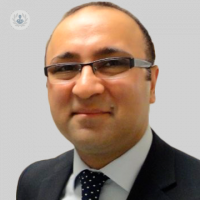11 ways to boost male fertility
Written by:Male fertility is in crisis. A broad review of 7,500 studies in 2017 shows that sperm counts among western men have reduced by more than half over the past 40 years. Worryingly, the authors of this review, from the Hebrew University of Jerusalem, have concluded that the decline shows ‘no evidence of abating’.
In the UK, roughly one in ten men suffer from infertility. Despite many studies recognising the problem, the causes for this decline and ways to reverse it are still not known. So, what can be done to improve sperm counts? Leading male fertility specialist, Mr Jas Kalsi gives us a rundown.

1. Exercise
Exercising regularly and losing weight can lead to increased sperm counts. A 2017 study found that performing 50 minutes of moderate exercise, three or four times a week increased sperm concentration and volume in overweight men.
2. Stop smoking
There are countless studies and reviews which all agree that smoking consistently reduces sperm count, motility and contributes to abnormal sperm morphology (the way sperm is shaped). You should consider giving this up if you are struggling to conceive.
3. Reduce your levels of stress
Your body reacts defensively to any form of stress as a way to conserve valuable energy. In times of distress, the body becomes less concerned with reproduction and more attentive on surviving. Keep stress levels down, try calming techniques and avoid high-stress situations whenever possible.
4. Limit alcohol use and avoid drugs
Although research on this topic is limited, some researchers have linked the use of drugs, such as alcohol, marijuana, and cocaine to decreased sperm production. So if you’re trying to conceive, it’s best to limit alcohol consumption to a minimum and avoid any use of recreational drugs.
5. Try to avoid certain prescription medications
Certain prescription medications that can temporarily decrease the healthy production of sperm. These include antibiotics, anti-androgens, anti-inflammatories, antipsychotics, corticosteroids, anabolic steroids and testosterone (the male hormone).
6. Increase your consumption of healthy fat intake
Polyunsaturated fats, also known as healthy fats, such as omega-3 and omega-6, are vital to the healthy development of the sperm membrane. Some studies have shown that when you consume these two omega compounds it can promote healthy sperm development.
7. Reduce unhealthy fat intake
A 2014 study that surveyed healthy men between 18 to 23 years of age, discovered that as they increased their consumption of trans fatty acids, their sperm count decreased in proportion.
Other studies have also found that trans fatty acids may weaken the ability of long-chain polyunsaturated fats to incorporate into sperm membranes – an essential part of healthy sperm development.
8. Increase your intake of antioxidant-rich foods
Antioxidants are molecules that can facilitate the removal and deactivation of free radicals that harm cells. Numerous vitamins and minerals have shown to act as antioxidants, which when consumed, can increase sperm count. These can include selenium, vitamin C (ascorbic acid), vitamin E, glutathione, coenzyme Q10 and I-carnitine. Recent studies have reported an improvement in all semen parameters as well as an improvement in DNA quality in the sperm. One such preparation is called Proxeed Plus, a supplement specifically formulated to maintain sperm health.
9. Stay away or limit your exposure to pollution and toxic chemicals
Our environment and atmosphere have become increasingly polluted. Environmental factors, such as air quality and chemical exposure, have often been connected to reduced sperm health. Try to avoid environmental toxins whenever possible.
10. Get enough folate and zinc
Consuming folate and zinc together has been shown to increase sperm health, including sperm concentration and overall count.
11. Avoid soy products and foods containing non-human oestrogen
There are some types of foods, especially soy products, which contain plant oestrogen (phytoestrogens). They have been proven to reduce testosterone bonding and sperm production. Try to limit your consumption of canned food and avoid plastic products as they are also high in synthetic forms of oestrogen.
How can I check how fertile I am?
If you have been trying to conceive for a year unsuccessfully, you should have a baseline semen analysis performed in an accredited laboratory. Semen analysis is a simple lab test that will confirm your baseline level and can help to show the cause of male infertility. Semen is collected by having you masturbate into a sterile cup.
The sperm volume, count, concentration, movement and structure will be assessed. The quality of your sperm is very important in your ability to conceive. For example, semen is considered regular if it turns from a thick, pale, whitish gel into a liquid within 20 minutes after ejaculation. If it doesn’t, it may mean there is a problem with the seminal vesicles - your male sex glands.
Lack of fructose (sugar) in a sperm-free sample may mean there are no seminal vesicles, or it may mean you have a blocked ejaculatory duct.
Keep in mind that if the semen test indicates low sperm numbers or no sperm at all, it doesn’t mean you are permanently infertile. It may simply highlight a problem with the growth or delivery of sperm. More tests should be taken, such as blood tests to investigate your hormone levels, a physical examination and an ultrasound of the scrotum to understand the main problem.
If you are experiencing problems conceiving and need to see a fertility specialist, visit Mr Jas Kalsi’s profile and book an appointment with him.


